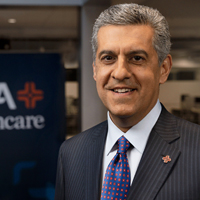COVID-19 has reshaped the world of work, especially for health care leaders. As reported by Mercer and other research institutions, a widespread workforce shortage in health care will increase in the next decade. As the population ages, demand for health services will only grow. But, what happens if the health care system is not prepared to care for them? Health care leaders are questioning how to navigate this uncertain future.
Sam Hazen, one of the country’s most influential health care leaders and CEO of HCA Healthcare, recently sat down for a Q&A session with members of Leadership Health Care (LHC), a membership organization of more than 600 emerging executives in the field. In the discussion, he shared insights from his career journey and what he is doing to prepare the company and his team for what is ahead. HCA Healthcare has notably weathered the COVID-19 storm successfully, thanks to its market position, significant resources and astute management decisions. In 2021, the company’s revenue grew 14% to $58.8 billion – not an easy feat amongst the strains of a pandemic.
Scaling Knowledge
As the most extensive health system in the U.S., one of HCA Healthcare’s undeniable strengths is its scale. The company:
- Operates 182 hospitals and 2,300+ sites of care throughout the U.S and the United Kingdom.
- Employs more than 283,000 colleagues.
- Has 35 million patient encounters each year.
- Cares for more COVID-19 inpatients than any other health system in the U.S., including over 271,000 patients from February 2020 to December 2021.
With such breadth comes opportunities for research and shared improvement in a condensed timeframe. HCA Healthcare uses data to quickly understand and modify care practices and business operations to increase efficiency and effectiveness to, ultimately, improve patient care.
“We’re a 24/7/365 operation – activity never stops. In my position, you’re always ‘on’ because something is always happening. That forces connection and continual learning,” said Hazen. “Our data gives us tremendous insights to study results and make sure our teams have the knowledge and resources to put their best forth every day.”
Creating Continuing Education and Learning Opportunities
Whether it is policy, consumer demands or an unexpected event like a pandemic or disaster, working in a health care organization requires a learning mindset. Research from McKinsey shows that businesses will emerge stronger from the pandemic if they start reskilling their workforces now. The U.S. Chamber of Commerce Foundation predicts that companies will increasingly compete based on how well they are able to find, source, develop, advance and retain employees.
As for himself, Hazen revealed that he reads and studies now as a CEO even more than he did in previous positions.
“I’ve been with HCA Healthcare for 39 years, and my deep understanding of its operations and culture enable me to make decisions as a leader. But along with that, I need to continuously learn and talk with people on the ground to update our strategy to achieve our mission,” said Hazen. “We have to constantly be thinking about what is next so we can be prepared to adapt.”
By the same token, HCA Healthcare focuses on education and training opportunities for its employees through a robust suite of in-house learning programs and supporting external learning initiatives like Leadership Health Care. The company recently acquired Galen College of Nursing. combining two leading nursing organizations to increase access to education and provide nursing career development opportunities that will positively impact patient care.. With the Galen collaboration, the company formed the largest academic-practice partnership in health care, aimed at training the nurses of tomorrow and giving seasoned clinicians opportunities to update their skills.
Building Health Care Leaders
Hazen offered advice from his own experience in building a successful career as a health care leader.
“When you finally get that promotion, you haven’t arrived – you’ve just begun. The position will require more of you, so prepare accordingly. At the same time, careers don’t go in a straight line. You may feel like your career is flatlining for a period of time, but don’t let that stop you from growing, being creative and taking on new challenges.”
When asked what advice he would give his younger self, Hazen said, “I would remind myself that the world is not as black and white as you think. Sure, process is important but equally important are people and relationships. After all, we are fundamentally in the people business.”
This executive briefing was presented by Bass Berry & Sims, and supported by Capio, Deloitte and naviHealth. Modern Healthcare served as a media sponsor.
Celebrating its 20th anniversary this year, Leadership Health Care is an initiative of the Nashville Health Care Council created to nurture the talents of future leaders. LHC provides members with regular, exclusive educational programs and networking opportunities. For more information, visit www.leadershiphealthcare.com.
